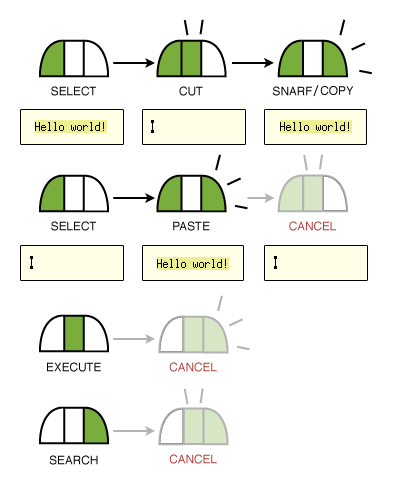- [acme](#acme)
- [vim](#vim)
## acme
Resources used:
[evbogdanox](//github.com/evbogdanov/acme/blob/master/README.md)
 Image by Tom Lieber
`Edit =`
Find current line number
`:13`
Go to the 13th line
`:0`
Go to file beginning
`:$`
:1,5 or Edit 1,5 select lines 1..5
Edit , d clear window
Edit , < echo hello world replace window body with some text
Edit , < erl -man maps replace window body with erlang manual
Edit , s/text/TEXT/g or Edit , | sed 's/text/TEXT/g' global replace
$winid current window id
echo some text | 9p write acme/$winid/body append to the end of current window
keyboard shortcuts:
ctrl-u delete from cursor to start of line
ctrl-w delete word before the cursor
ctrl-h delete character before the cursor
ctrl-a move cursor to start of the line
ctrl-e move cursor to end of the line
ctrl-i tab
ctrl-j enter
ctrl-f filepath autocompletion
press esc to select the last typed text
press esc again to delete any selected text
## vim
###
Vim tutorial
## What you MUST do
### No. 1
Stop using default keybinds to save a file, don't bother with
To default save a file one has to...
- hold shift
- press ':'
- enter 'w'
if you are not already in escape mode one has to
- press 'esc'
that is too many keypresses,
even 'ZZ' is no good
# Useful
- `gj` and `gk`
- move cursor up and down to wrapped part of a line
- `g0` and `g$`
- move cursos te first and last letter of wrapped line
- `gq`
- turn long line into multiple lines
- `gu` and `gU`
- uncapitalize and capitalize words/lines
- `~` and `g~`
- `gf`
- open highlighted text as file
- `gJ`
- conjoining lines without leaving spaces
- `<`
- remove indent, first highlight
- `>`
- apply indent, firsh highlight
Vim includes a man page viewer, :Man , in its runtime files. Even better, you can just place your cursor on a word in the buffer and press K ( \K ) to see the man page for that word.24 May 2013
set mouse=a
Image by Tom Lieber
`Edit =`
Find current line number
`:13`
Go to the 13th line
`:0`
Go to file beginning
`:$`
:1,5 or Edit 1,5 select lines 1..5
Edit , d clear window
Edit , < echo hello world replace window body with some text
Edit , < erl -man maps replace window body with erlang manual
Edit , s/text/TEXT/g or Edit , | sed 's/text/TEXT/g' global replace
$winid current window id
echo some text | 9p write acme/$winid/body append to the end of current window
keyboard shortcuts:
ctrl-u delete from cursor to start of line
ctrl-w delete word before the cursor
ctrl-h delete character before the cursor
ctrl-a move cursor to start of the line
ctrl-e move cursor to end of the line
ctrl-i tab
ctrl-j enter
ctrl-f filepath autocompletion
press esc to select the last typed text
press esc again to delete any selected text
## vim
###
Vim tutorial
## What you MUST do
### No. 1
Stop using default keybinds to save a file, don't bother with
To default save a file one has to...
- hold shift
- press ':'
- enter 'w'
if you are not already in escape mode one has to
- press 'esc'
that is too many keypresses,
even 'ZZ' is no good
# Useful
- `gj` and `gk`
- move cursor up and down to wrapped part of a line
- `g0` and `g$`
- move cursos te first and last letter of wrapped line
- `gq`
- turn long line into multiple lines
- `gu` and `gU`
- uncapitalize and capitalize words/lines
- `~` and `g~`
- `gf`
- open highlighted text as file
- `gJ`
- conjoining lines without leaving spaces
- `<`
- remove indent, first highlight
- `>`
- apply indent, firsh highlight
Vim includes a man page viewer, :Man , in its runtime files. Even better, you can just place your cursor on a word in the buffer and press K ( \K ) to see the man page for that word.24 May 2013
set mouse=a
 ### Personal config
Computers are the closest thing mankind has to magic
### Personal config
Computers are the closest thing mankind has to magic
 ### Personal config
Computers are the closest thing mankind has to magic
### Personal config
Computers are the closest thing mankind has to magic
 Image by Tom Lieber
`Edit =`
Find current line number
`:13`
Go to the 13th line
`:0`
Go to file beginning
`:$`
:1,5 or Edit 1,5 select lines 1..5
Edit , d clear window
Edit , < echo hello world replace window body with some text
Edit , < erl -man maps replace window body with erlang manual
Edit , s/text/TEXT/g or Edit , | sed 's/text/TEXT/g' global replace
$winid current window id
echo some text | 9p write acme/$winid/body append to the end of current window
keyboard shortcuts:
ctrl-u delete from cursor to start of line
ctrl-w delete word before the cursor
ctrl-h delete character before the cursor
ctrl-a move cursor to start of the line
ctrl-e move cursor to end of the line
ctrl-i tab
ctrl-j enter
ctrl-f filepath autocompletion
press esc to select the last typed text
press esc again to delete any selected text
## vim
###
Vim tutorial
## What you MUST do
### No. 1
Stop using default keybinds to save a file, don't bother with
To default save a file one has to...
- hold shift
- press ':'
- enter 'w'
if you are not already in escape mode one has to
- press 'esc'
that is too many keypresses,
even 'ZZ' is no good
# Useful
- `gj` and `gk`
- move cursor up and down to wrapped part of a line
- `g0` and `g$`
- move cursos te first and last letter of wrapped line
- `gq`
- turn long line into multiple lines
- `gu` and `gU`
- uncapitalize and capitalize words/lines
- `~` and `g~`
- `gf`
- open highlighted text as file
- `gJ`
- conjoining lines without leaving spaces
- `<`
- remove indent, first highlight
- `>`
- apply indent, firsh highlight
Vim includes a man page viewer, :Man , in its runtime files. Even better, you can just place your cursor on a word in the buffer and press
Image by Tom Lieber
`Edit =`
Find current line number
`:13`
Go to the 13th line
`:0`
Go to file beginning
`:$`
:1,5 or Edit 1,5 select lines 1..5
Edit , d clear window
Edit , < echo hello world replace window body with some text
Edit , < erl -man maps replace window body with erlang manual
Edit , s/text/TEXT/g or Edit , | sed 's/text/TEXT/g' global replace
$winid current window id
echo some text | 9p write acme/$winid/body append to the end of current window
keyboard shortcuts:
ctrl-u delete from cursor to start of line
ctrl-w delete word before the cursor
ctrl-h delete character before the cursor
ctrl-a move cursor to start of the line
ctrl-e move cursor to end of the line
ctrl-i tab
ctrl-j enter
ctrl-f filepath autocompletion
press esc to select the last typed text
press esc again to delete any selected text
## vim
###
Vim tutorial
## What you MUST do
### No. 1
Stop using default keybinds to save a file, don't bother with
To default save a file one has to...
- hold shift
- press ':'
- enter 'w'
if you are not already in escape mode one has to
- press 'esc'
that is too many keypresses,
even 'ZZ' is no good
# Useful
- `gj` and `gk`
- move cursor up and down to wrapped part of a line
- `g0` and `g$`
- move cursos te first and last letter of wrapped line
- `gq`
- turn long line into multiple lines
- `gu` and `gU`
- uncapitalize and capitalize words/lines
- `~` and `g~`
- `gf`
- open highlighted text as file
- `gJ`
- conjoining lines without leaving spaces
- `<`
- remove indent, first highlight
- `>`
- apply indent, firsh highlight
Vim includes a man page viewer, :Man , in its runtime files. Even better, you can just place your cursor on a word in the buffer and press  ### Personal config
Computers are the closest thing mankind has to magic
### Personal config
Computers are the closest thing mankind has to magic